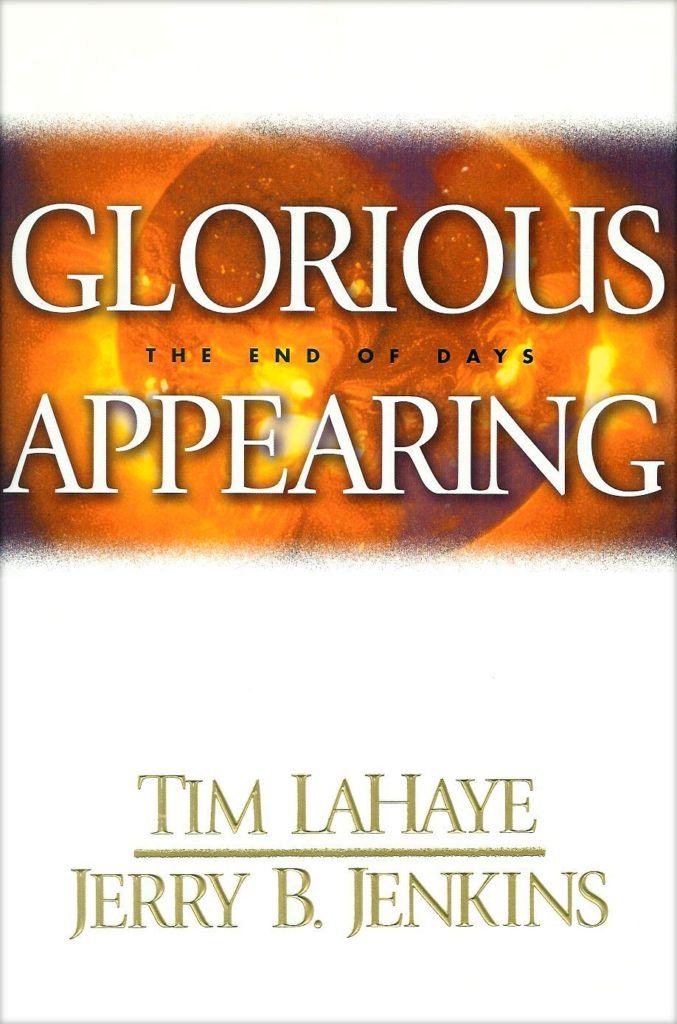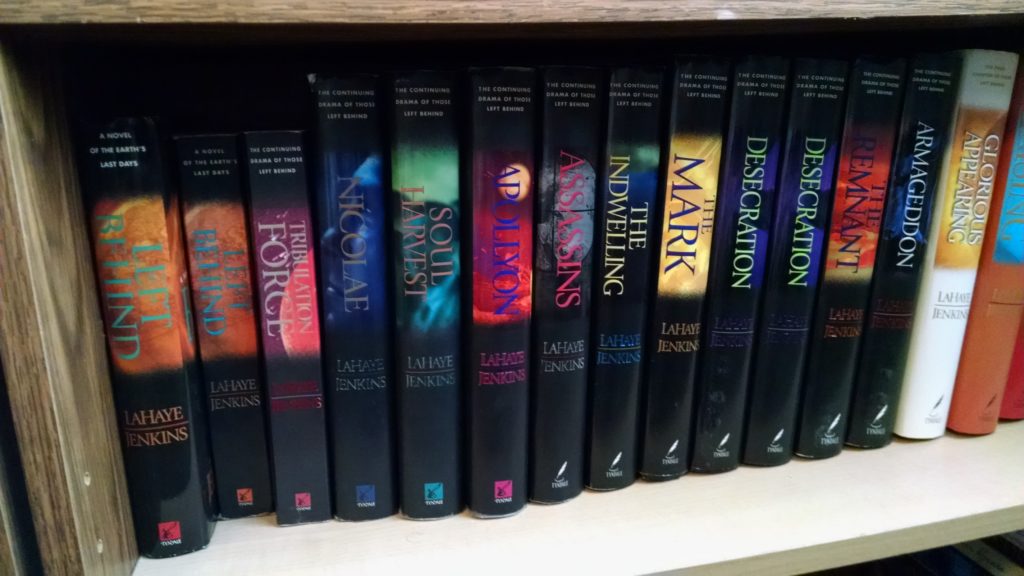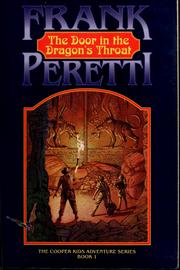Twelve Reasons The ‘Left Behind’ Series Is Actually Awesome, Part 4
The Left Behind movie with Nicolas Cage was soulless and slapshod. But no movie can ever reflect my fond memories of the original apocalyptic-thriller novels or their actual themes.
That’s the main point of this miniseries of articles designed to show why the Left Behind novels by Tim LaHaye and Jerry B. Jenkins are actually awesome. Yes, I say this despite knowing of the series’ doctrinal and fictional flaws, and the fact that many readers believe the story is how things will “really” happen rather than enjoying them as “mere” fiction.
In part 1, I said the series offers a fantastical story with vivid characters and decent world-building for the pre–, mid–, and post-apocalyptic world of LB. Part 2 overviewed the novels’ action, organic “preachy” content (the stuff the movie bizarrely left out and shouldn’t have), and fandom of even non-Christian readers. In part 3, I said the LB series also contradicts stereotypes about Christian fiction by having badass (can I say badass?) cover designs, an overall epic vision for the story — 12 novels covering seven years of apocalypse — plus an ethnically diverse cast that goes far beyond, say, the film’s awkward attempts at “diversity.”
Now for three final reasons the original Left Behind novels are actually kind of awesome.
10. Many emotional journeys have heart
I don’t know a lot of Christian fiction that explores emotional journeys similar to these:
- Professional evangelical pastor Bruce Barnes spends years covering up his actual disbelief in the Bible while he lives a life of clean-cut, upper-middle-class white-picket-fence sin. Then he misses the “rapture” and is forced to face who he truly is.
- Pilot Rayford Steele loses his wife in the “rapture” and misses her greatly, but finds healing by marrying her best friend, Amanda White. Then Amanda goes missing on an airplane after a global earthquake, and Ray and his copilot Mac McCullum deep-sea dive in the Tigris River in an attempt to find her. The plane is down there, full of decomposing bodies, and so is Amanda. Ray is heartbroken all over again, driven to despair—and driven to plot vengeance against the Antichrist who lied about her.
- Buck and Chloe Williams struggle with whether to have a child despite the evils and promised plagues of their world. Finally they do. But Chloe is in anguish over the possibility that the Antichrist’s hordes could capture their son. Finally she concludes that it would be better for her to kill him rather than let him fall into their hands. Dark stuff here, people. Yes, even good Christians have had to face such decisions.
- Dr. Tsion Ben-Judah, a Jewish scholar, converts to faith in Christ. Yet he spends the rest of his life like the apostle Paul in Rom. 11 — almost wishing that he could undo his conversion in order to bring his own people to the Savior he loves.
- Dozens of other Christians across the world convert and face ostracism or worse.
Despite the sparse writing styles and other flaws in LB, each of these journeys has honest emotional resonance and reflections of in-depth humanity: “realism” like we say we want.
11. Fantastical events are thrilling
In part 1, reason 1, I said the story was fantastical. This springs from that: most of the time the magic/miracles of the LB series are quite amazing. (This is especially true if you are or were a teen/young adult Christian reader who wasn’t yet accustomed to fantastical fiction. Hardcore fantasy buffs may dismiss this as naïveté, but hey, we must all start somewhere.)
 With the exception of the “rapture” and then the Antichrist’s mind-altering stunt,1 the first two novels started out slow in the miracles department. Jenkins seemed to have decided that a long warmup was better, allowing more time to focus on important stuff like character development and careful thematic explanation about basic Christianity, along with this whole “Tribulation” thing and where it comes from and why it is necessary.2 But when the magic and miracles arrive thanks to more (literally interpreted) Revelation prophecies, it seems well worth the wait: global earthquake, a rain of hailstones and fire and blood, two massive meteorites, an ice age caused by supernaturally dimmed sunlight, then worse.
With the exception of the “rapture” and then the Antichrist’s mind-altering stunt,1 the first two novels started out slow in the miracles department. Jenkins seemed to have decided that a long warmup was better, allowing more time to focus on important stuff like character development and careful thematic explanation about basic Christianity, along with this whole “Tribulation” thing and where it comes from and why it is necessary.2 But when the magic and miracles arrive thanks to more (literally interpreted) Revelation prophecies, it seems well worth the wait: global earthquake, a rain of hailstones and fire and blood, two massive meteorites, an ice age caused by supernaturally dimmed sunlight, then worse.
I remember especially anticipating the fifth book, Apollyon, because I knew there would be real live demon locusts as in Revelation 9.3 So I was a little disappointed (and remain so today) when it turned out the locusts were swarming in one or two chapters and then kind of forgotten for the rest of the book in favor of Buck Williams trying to get back to America in time for his wife’s childbirth. Buck takes a flight back without so much as a demon locust splatted on the fighter jet windshield.
And what about the fallout from this extra-specially supernatural plague? You would think the world government would have some kind of explanation. Perhaps Nicolae Carpathia, the series’ Antichrist, would concoct a great lie about how these parasites or alien beings have invaded Earth which proves we are not alone, so let’s all unite and put all our faith in our dear leader to save us. It doesn’t happen. LB got bored of the demon locusts—bored of demon locusts?!—and at some point they just sort of all die away in the narrative, literally.
Perhaps the author(s) just weren’t ready for that threshold of the fantastical. The next book Assassins tries to hit a reset by making the next demonic army, this time demon horsemen, invisible to everyone except sporadically to certain Christians. That way the Antichrist and his devotees have plausible deniability about the Christians’ “horsemen” claims and instead can claim the fires and deaths are coming from chemical warfare. And this works, actually better than the demon locusts—though you’d think Antichrist and Co. would give at least some credence to the demon-horsemen belief after those demon locusts a few months ago.
Some miracles get repetitive and less thrilling. This occurs particularly when the author(s) seem to fear speculating overmuch and end up repeating biblical events from the Torah, such as plagues, a parting-of-the-Red-Sea equivalent, water bursting out of rocks, and rebels being swallowed whole into the earth. To me it seems that in a series based on an brand-new end-times notion—Jesus will snatch people off the planet for some length of time before he actually physically returns—you really can afford to speculate more.
That aside, the events are thrilling. Especially when you get to the actual Second Coming.
12. Despite all flaws, the series points to Jesus Christ
 This is why I stuck with the Left Behind series all along. Unlike the movie(s) or many of their fans who seem obsessed with the “rapture” concept and escaping planet Earth, I wanted to anticipate an imagination of the actual physical second coming of Jesus to Earth. All Christians believe in that prophesied return. All Christians long to take comfort in his promise that he will be back. We should be anticipating not some secret “rapture” (whether or not you agree with that), but that wondrous moment when Jesus will return truly and visibly “in the same way as [his disciples] saw him go into heaven” (Acts 1:11).
This is why I stuck with the Left Behind series all along. Unlike the movie(s) or many of their fans who seem obsessed with the “rapture” concept and escaping planet Earth, I wanted to anticipate an imagination of the actual physical second coming of Jesus to Earth. All Christians believe in that prophesied return. All Christians long to take comfort in his promise that he will be back. We should be anticipating not some secret “rapture” (whether or not you agree with that), but that wondrous moment when Jesus will return truly and visibly “in the same way as [his disciples] saw him go into heaven” (Acts 1:11).
The final Left Behind novel,4 Glorious Appearing, released March 30, 2004. Really it’s a bit painful when Jesus returns in the middle of your spring university semester but nothing changes afterward and you still have to study for finals.
I enjoyed Glorious Appearing. I found it a fitting if not anticlimactic conclusion to the novels I’d been reading since 1997. But the book isn’t sure how to handle the spectacular return of Jesus Christ. This is big. Really big. At once the novel needs to wrap up a 12-volume story with heroes and side characters and battles and villains even while trying to be fantastical even while trying not to violate Scripture even while trying to synchronize or reconcile all the apparent Old Testament prophecies about the Lord touching down on mountains.
That last leads to three different scenes, first at Petra, then at the Mount of Olives, then finally at Jerusalem, in which Jesus Christ shows up, mass armies of villains fire upon him, he nukes them with the “sword” from his mouth — his spoken truthful words — and they all die horribly. 5 What happens in the meantime? How do Christians respond to this? How do they keep up? And let this challenge your faith a little: if Jesus Christ will return physically and gloriously (after all, to this day our Savior remains a resurrected though incarnate Man!) so that all people can see him, how will everyone in the world see him?
With all these challenges, it’s a wonder that Glorious Appearing managed to pull it off at all. Yet the authors’ chronically sparse style removes quite a lot of the wonder and magic that must accompany anticipation for the Lord’s return. Readers: bring your own longing.
 I did and that’s why I enjoyed the book. But I wondered if the dramatic audio version would amplify the story’s emotional effect as usual. True to my hopes, the Glorious Appearing drama absolutely sizzles. Jesus himself sounds a little like Christian music artist Steve Green. But it’s the human heroes and their brilliant audio actors who absolutely sell the unrestrained joy of Jesus’s second coming. When I listen to these stories, I am “inspired” and longing for his return in a way that the Left Behind movie(s) have neither the budget nor the motive to explore.
I did and that’s why I enjoyed the book. But I wondered if the dramatic audio version would amplify the story’s emotional effect as usual. True to my hopes, the Glorious Appearing drama absolutely sizzles. Jesus himself sounds a little like Christian music artist Steve Green. But it’s the human heroes and their brilliant audio actors who absolutely sell the unrestrained joy of Jesus’s second coming. When I listen to these stories, I am “inspired” and longing for his return in a way that the Left Behind movie(s) have neither the budget nor the motive to explore.
You may not have heard the Glorious Appearing drama. But maybe you have read The Last Battle, the final story in C. S. Lewis’s The Chronicles of Narnia series. And maybe you felt that beautiful, horrible ache for Jesus to return and make all things new. If that’s you, then you know what I mean and you know what I felt when hearing Glorious Appearing.
The end is here
And that’s it, folks. That’s why I ultimately conclude that despite all the nonsense—flawed end-times beliefs, overzealous “rapture”-ready fans, dry fiction style, fantastical fails, etc.—the Left Behind series is actually awesome: because it points to Jesus Christ. That’s why I can’t join the bandwagon of Christians who love to hate on Left Behind. I certainly can’t agree with Christianity Today reviewer Jackson Cuidan when he claims “the Left Behind books were not Christian.” Yes, they were Christian. They reflected Jesus Christ. Yes, they were about overall-realistic people. And yes, they were about an overall-realistic world.
That’s all you need for good fiction, “Christian” or otherwise, that is actually awesome.
- On further reflection, I found it strange that author(s) who so strongly emphasize the free will of human beings would explore overtly the notion that Satan or his agents can overrule human free will. ↩
- Again, the recent film completely ignored this vital “preachiness,” leaving many viewers utterly confused about the point of the “rapture” and the rest. ↩
- I was also glad to find that LB’s version could be in total continuity with Frank Peretti’s exploration of the concept in The Door in the Dragon’s Throat. ↩
- Discounting the prequel trilogy. ↩
- Even non-evangelical-Christian readers of LB show respect for Jesus’s supernatural killpower. See the TVTropes page for the Left Behind novels that ascribes Glorious Appearing moments comical “trope” names. These include: 1. “Curb-Stomp Battle: When Jesus comes into the scene and slaughters Global Community troops en masse just by speaking the Word of God, it’s a total Game Breaker. He’s also unstoppable, as evidenced in the Dramatic Audio presentation of Glorious Appearing where the Antichrist armies launch rockets at Him with no success.” And 2. “Kung-Fu Jesus: Jesus Himself. He just speaks The Word and people die.” ↩












































I don’t think this series shows that it’s awesome. I do think it shows why it’s such a powerful cultural experience with evangelicals, but you can have a work that’s a powerful cultural experience and still be pretty bad. The Da Vinci Code, case in point.
Evangelicals really don’t have these kinds of experiences. Very few markets cater to them specifically on a large scale, and devout Christianity is now a subculture instead of convention. So Left Behind was water into parched soil, and evangelicals soaked it up. I think your liking of it is more because of being a part of that culture, than it’s real awesomeness. Kind of the same way people swear by 80’s cartoons like Transformers or GI Joe, when they are some pretty horrible stuff. (I loved both as a kid, so I can say this.)
I wasn’t really into evangelicalism then, so I don’t get the same love for it. When I was into it, it was late 80’s-early 90’s, and things like Frank Peretti’s books or CCM of that era is my “awesome” stuff.